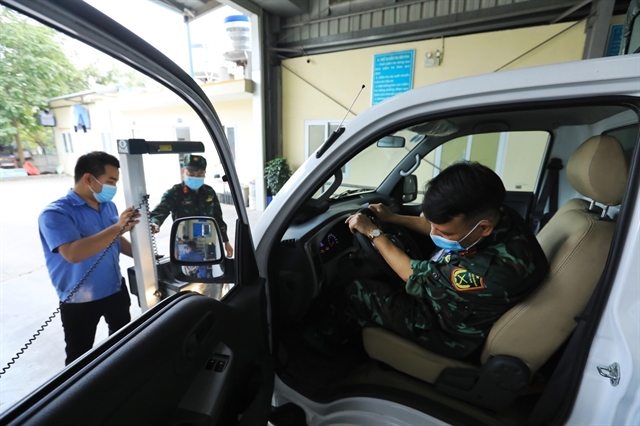 Society
Society

 |
| Military officials inspect a truck at an automobile registration centre in Hà Nội's Long Biên District. — VNA/VNS Photo Tuấn Anh |
HÀ NỘI — Understaffed vehicle registration centres in Hà Nội and HCM City have received support from the military as they struggle to cope with the surge in demand caused by the closure of several centres for investigation in recent few months.
Since Monday, 19 military inspectors have been mobilised to work at nine registration centres in Hà Nội, including Đông Anh, Chương Mỹ, Thanh Oai, Long Biên, Sơn Tây, Thường Tín and Hoài Đức.
Eleven others have been assigned to work at five centres in districts 7, 12 and Bình Chánh District in HCM City.
The Việt Nam Register has received and trained 40 military inspectors, including 30 official and ten reserve inspectors.
The Department of Motorcycles asked the General Department of Engineering under the General Staff of the Việt Nam People's Army for support.
Together they coordinated with the Việt Nam Register to organise two training courses for 84 inspectors in the two cities.
The military inspectors were trained in motor vehicle inspection, including regulations and inspection management software at registration centres.
Major General Hà Tuấn Quân, deputy director of the General Department of Engineering, said these skills were an important basis for military inspectors to quickly and effectively integrate into registration centres.
Director of the Việt Nam Register Nguyễn Chiến Thắng said military support would help ease the pressure on registration centres.
Since the end of 2022, police have investigated many vehicle testing and inspection centres. Roughly 500 leaders and employees of more than 70 centres have been charged with giving and taking bribes, and falsifying documents.
As of March 17, 58 of 281 centres have been suspended from operations.
In Hà Nội, 15 centres are temporarily closed for investigation.
This has led to the remaining auto inspection centres being overwhelmed. Many vehicle owners are waiting days for testing.
New car inspection exemptions
A draft circular amending and supplementing the Ministry of Transport's Circular 16 proposes that inspection exemptions be applied to new vehicles.
Under the amended draft circular on technical safety inspection and environmental protection of road vehicles, new and unused motor vehicles will receive a three-year exemption.
Currently, new vehicles don't have to undertake this inspection for two years and a half.
The Vietnam Register estimates that in 2023 this exception will apply to around 500,000 new cars.
The draft circular also extends registration terms for some types of motor vehicles. That means vehicle owners will have longer time between two inspections.
Private cars with up to nine seats and manufactured less than seven years ago will be required to re-register the vehicle after 36 months, instead of 30 months currently.
After the second inspection, the vehicles must undertake an inspection every two years instead of two years and a half currently.
Vehicles manufactured between 7-15 years ago must be inspected every year, while those manufactured more than 15 years must re-register every six months.
The registration terms for passenger cars don't change in the draft circular.
Passenger cars manufactured under five years are required to get the first inspection after two years and re-register every year.
Passenger cars manufactured more than five years ago must be re-registered every six months.
Trucks and tractors manufactured 20 years or longer ago will be required to be re-inspected every six months.
In particular, passenger cars of more than nine seats that are 15 years old or more will be re-registered every three months.
“We keep the three-month registration term for this vehicle because they are usually brought to rural and remote areas to carry people after a long time of use in big cities," it said. "This poses unsafety risks and needs strict control to ensure people’s safety and protect the environment.”
The amended and supplemented circular is based on statistics and evaluation from the inspection database and international inspection experience. It is also based on the operation frequency of vehicles and the purpose of each type of vehicle.
For example, personal cars are often converted into taxis, though many don't always undergo the correct inspection frequency. Therefore, solutions require research to ensure the appropriate inspection cycle to ensure traffic safety. — VNS




